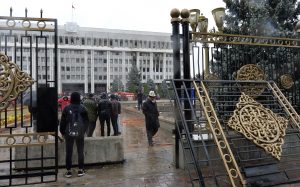After a night of protests that overran the Kyrgyz White House and sprung former President Almazbek Atambayev and others from jail, the country’s Central Election Commission (CEC) announced the annulment of the election results that sparked the dramatic, and deadly, night.
In the overnight clashes between police and protestors a reported 590 people were injured and a 19-year-old man killed. The mayor of Bishkek, Aziz Surakmatov, resigned as did the governors of Naryn, Talas, and Issyk-Kul regions.
According to the president’s press secretary, President Jeenbekov is still in Bishkek and still in charge. He said in a video message early on October 6, as reported by RFE/RL, that he was ready to have the contested parliamentary elections results annulled.
At the very least, a new parliamentary election is in the cards, but what actually happens next is anyone’s guess.
The situation continues to evolve even as I type. The events of October 5 arguably have the country one foot into its next revolution. But even if that’s so, the past can tell us only so much about the course of events to come.
Kyrgyzstan, which celebrated its 29th year of independence in August 2020, has a revolutionary spirit. In 2005, in what would come to be called the Tulip Revolution, Kyrgyzstan’s first president, Askar Akayev, was ousted a month after parliamentary elections in which pro-presidential parties performed best. As protests grew and Akayev’s attempts to placate the angry masses failed, Kyrgyzstan’s first president fled to Kazakhstan and then to Russia where he official resigned from office. He remains in Russia to this day.
At the head of the protest movement that pushed out Akayev was Kurmanbek Bakiyev, who had served as prime minister previously and headed a electoral alliance that had formed ahead of the February 2005 parliamentary election. Bakiyev was elected after Akayev’s ouster with 89 percent of the vote. But his administration was quickly plagued by accusations of corruption and cronyism, paired with an economic and energy crisis which came to a head in the winter of 2009-2010. Once spring arrived, the revolution did too. Protests in early April 2010 grew in size particularly in the north of the country. On April 7, 2010 protesters broke down the gates of the White House and Bakiyev fled south to Osh. He refused to resign but by April 15 had fled the country to Kazakhstan, ending up in Belarus by April 20 where he was welcomed by President Alexander Lukashenko. Bakiyev remains in Belarus.
Bakiyev’s ouster was followed in the summer of 2010 by violent and deadly ethnic clashes in Kyrgyzstan’s south.
In the months after the election, there was a referendum on a new constitution which made Kyrgyzstan the region’s only technically parliamentary republic. The aim was to reduce the power of the president. An interim government headed by Roza Otunbayeva ruled until new presidential elections in October 2011 that brought Almazbek Atambayev to power. But new constitution or not, Atambayev retained and throughout his single six-year term regained plenty of power for the presidential seat. Toward the end of his term, Atambayev pushed through a referendum which included constitutional changes which broadened the power of the prime minister. Many assumed Atambayev had his eyes on a Putinesque stint as prime minister after the end of his presidential term.
But, as we now know, nothing worked out the way Atambayev had hoped. His hand-picked successor, Sooronbay Jeenbekov, kicked his predecessor to the proverbial curb. Their feud split Kyrgyzstan’s then-dominant political party, the Social Democratic Party of Kyrgyzstan (SDPK), and led to the jailing of several Atambayev cronies before Atamaybev himself ended up in jail, too. Atambayev’s arrest the day after a dramatic botched raid at his compound at Koi-Tash, which resulted in the death of a special forces officer, yielded dramatic scenes and widespread worries of revolution.
In 2020, we find Kyrgyzstan on the same road paved by its previous revolutions and presidents.
Figures from the Akayev, Bakiyev and Atambayev eras remain serious political players in Kyrgyzstan. And Kyrgyz know that: In Bishkek a petition is going around seeking to restrict former political elites from future political activity. Nevertheless, old faces are reappearing.
A group of 13 political parties, according to 24.kg — including Ata-Meken, Butun Kyrgyzstan, Zamandash, Social Democrats, Bir Bol, Ordo, Respublika, and Reforma — formed a Coordinating Council headed by Butun Kyrgyzstan’s Adakhan Madumarov. The council also named Omurbek Suvanaliev head of the Security Council. Suvanaliev had been appointed a deputy secretary of the Security Council in February 2019 by Jeenbekov.
Meanwhile, Janar Akaev, the head of Ata-Meken party, announced that on October 7 parliament will hold an extraordinary session to elect a new prime minister, speaker and government. Earlier, a group of 35 parliamentarians supported appointing Sadyr Japarov prime minister after Japarov was sprung from jail. Japarov was sentenced to 11.5 years in 2017 for his 2013 leading of protests to nationalize the Kumtor gold mind, followed by the kidnapping of a regional governor.
The parliament needs a quorum to truly act, whether appointing new leaders or impeaching Jeenbekov.
In the meantime, in addition to Atambayev and Japarov, Sapar Isakov has been freed from the prison colony he was serving time in, along with Ravshan Dzhenbekov, a former MP arrested in conjunction with the Koi-Tash events of August 2019.
Whether the post-election chaos yields to a full-blow revolution — it would be Kyrgyzstan’s third in 15 years — is unclear. Jeenbekov appears, for now, to remain in power and could ride out the parliamentary storm. Or, we could wake up tomorrow with him on a plane to Moscow.

































